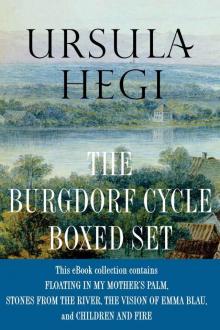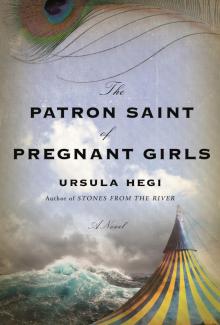- Home
- Ursula Hegi
The Patron Saint of Pregnant Girls Page 2
The Patron Saint of Pregnant Girls Read online
Page 2
The Old Women have seen many misfortunes, learned to survive the most terrible heartbreaks, and sleep with the fear of forgetting the faces of those they lost. They feel ashamed of their gratitude that their grandchildren and great-grandchildren have been spared. To ward off fate and to honor tradition, they draw close and coordinate what each will cook for the Jansen family in the weeks to come.
“Losing one husband to the sea is not as terrible as losing three children.”
“Losing one husband and one son to the war is not as terrible as losing three children.”
“Losing one daughter to childbirth…”
“… one son to influenza.”
Winning land and losing land again. Losing lives.
Losing—
The Nordsee has a great appetite for sacrifice. Today it seized three lives because the people raised the dikes again to hinder the flooding of Neuland—new land. In ditches they trapped the sea, isolated it in long solitary fingers until it could no longer gather force but fizzled out its rage, stagnant while sediment accumulated on the Meeresboden—sea floor. They consider it their birthright to defend what they’ve preserved. But the Nordsee remembers. Retaliates. Swells once again. To keep Hochwasser—high water—from invading their houses, people fill burlap sacks with sand and heap them outside their doors where they slump like new kittens.
* * *
After dark and after the islanders scrub off the gray-black sludge that clogs the wheels of their carriages, the priest holds a Mass for the Jansen children. But their parents are not in church. I nudge Heike into a pew, follow her.
“I want to play with Hannelore,” she cries.
Parishioners turn. “Ssshhhh…”
Sobbing, the priest is sobbing as he clambers up to the gold and black pulpit to recount the freak wave that launched the children into heaven. “Hannelore Jansen six years old—”
“I want to play—”
I press one finger across my daughter’s lips.
The priest’s chin quivers. “Bärbel Jansen two years old.”
“I want to play with Hannelore’s baby.”
“Tilli’s baby?”
“Ssshhhh … Ssshhhh…”
“Martin Jansen four years old—”
A child is a child till you are dead. You. Not your child. Especially a child who’s not safe in the world. Who doesn’t understand why she can’t take what she likes; why she’s forbidden to sit on the laps of strangers. She’ll be up half the night, exuberant with ideas of what she wants to do, and as her voice revs up, I can predict the fall when she’s motionless in bed or by the window, barely speaking or eating. Once again I straddle the chasm, feet dug into both rims, to keep myself from going down and up with Heike’s moods, help her find the way back to herself. To me.
“Three children before the age of knowledge,” says the priest. “A sign how precious their lives are to God. That’s why He sent the immense wave.”
Today I’ve witnessed how quickly you can lose a child, three children, and I’m terrified more than ever. At least Lotte and Kalle have each other. But Heike only has me. Even if I live to be old, I must find a husband for her, a kind husband to keep her from harm. Since she is without fear, I carry it for both of us, her fear and mine. He, too, didn’t know fear, Heike’s father. Or remorse. The Sensational Sebastian was a dazzling man with long arms and an easy laugh, a trapeze artist who was convinced he must keep moving to prevent his body from turning to stone.
“And we have proof,” says the priest, “that the wave delivered the Jansen children directly to God. Because once the sun set, the clouds grew darker, but not solid, revealing flashes of heaven that streaked the sky crimson and yellow.”
What will become of my daughter if I die tomorrow? Or ten years from now? It’s inside your fear where a child who’s not safe without you will nest, mistaking it for love. Even I mistake it for love. Heike bounces between impulses, between bliss and desolation. Himmelhoch jauchzend, zu Tode betrübt. In her bliss, she gets too affectionate. Men sniff around the big tent, rattled when the Ludwigs and I chase them off. I must be with her every moment, but of course she gets away. One already scraped from her womb before she turned fifteen. Blood, so much blood I feared she was dying. Six months later another pregnancy. When the nurse whispered she could fix Heike, I let her. Because I need my strength for my daughter alone. If Heike had a child, she’d forget to feed it. Forget it’s there.
“And purple,” adds the priest. “Purple the color of remorse, the color of forgiveness. Purple is in the sky often enough with yellow to make it true for today.”
* * *
Still in their mud-caked clothes, the children’s parents sit in their kitchen where the smell of applesauce is thicker than this morning when Lotte boiled apples with water and cinnamon. Too hot to taste, she warned her children who clamored for a spoonful. After we get home from the Zirkus, she promised.
But they didn’t come home.
A promise broken.
Wilhelm’s mouth tugs at her breast. Dry, she’s gone dry. Her body has forgotten how to keep children alive, the same body that used to make plenty of milk, so much that she needed the nursing as much as her babies. If she waits too long, her breasts swell, harden, a pain so urgent that Kalle has to relieve her. He adores her milk. Once, she pulled him into the church, into the empty confessional, and let him. Lighten her. Push himself inside her as they braced against the latticework.
Wilhelm whimpers against her skin, too tired to scream any longer; and Kalle fetches a saucer with sheep’s milk, dips a finger into it. When he slides it between his son’s gums, Wilhelm bucks, coughs. Again, Kalle tries.
“Applesauce,” Lotte says. “Use applesauce.”
Sucking cooled applesauce from his finger, the boy. And swallowing. His eyelids flutter.
Lotte props her elbows on the table. The rim of her clavicle rises. And Kalle knows he has to get away to stop himself from admitting he’s brought on their children’s deaths with his illusions of leaving his family behind and traveling with the Ludwig Zirkus, adventurous and unencumbered. Wanderlust.
If Lotte finds out, she’ll send me away. As children they all played Zirkus. Lotte, too. Strung rope between posts and practiced tightrope walking till they toppled. Inspired by Zirkus animals, they taught dancing to their dogs whose herding instincts bewildered them so that they yapped and whimpered, agitating sheep and cattle. And the sheep did not obey when taught to be ponies and gallop in a wide circle. It took just one to kneel, for the others to stumble into one pile. Lotte was part of all that—except for her it has stayed in childhood. It’s like that for girls. They grow into the dreams of women, while boys still wait for the Zirkus and adventure, so close in dreams and yet out of reach. Except for now—
* * *
From the table he picks up Hannelore’s doll that he and Lotte made together: he carved the trunk and limbs, while Lotte crocheted a yellow dress, embroidered the linen face, attached yarn braids.
Talking, Lotte. She’s talking about a horrendous bargain. And how it came to her and how she gave shape to it by promising God—
“What?” Kalle asks, startled. “Promising what?”
Her palms prop up her face, stretch all flesh away from her jawbone and cheeks. “The one in my arms for the other three.”
“I would.” Kalle tries to pull his finger from his lastborn who only sucks harder, all his life-power concentrated in his mouth. “Even for two. I’d trade this one for two. If we could bring two of the others home in return for Wilhelm, I would.” As long as I don’t have to choose.
But what if I must? Hannelore with the gap between her front teeth, tongue probing where her baby teeth used to be? Martin, sturdy and fast, who can fly from good-natured to sullen in a second? Bärbel who gets dirty so quickly, who loves exuberantly, noisily?
The queasy strength of the boy’s suck. Always needing more than his share. Kalle would offer him up for just one. If only Lotte had let go o
f the lastborn instead—Lotte grips Hannelore’s free hand, makes a circle, saves the three. Or saves two, at least two. Even if the girls can’t hold on to Martin, Lotte has her fingers around the girls’ wrists, yes, tight, so tight they leave marks. When she carries them home, Kalle tends to his daughters’ wrists—don’t think about Martin don’t—smears lanolin on their chafed skin. Sticky and smelly. Extracted from sheep’s wool.
Hannelore rubs it off. Bärbel drops asleep in his arms, instantly heavy.
“Don’t make me lose them again,” Lotte whispers.
Dreaming of traveling with the Zirkus is not half as terrible as what you did.
But to say those words aloud will devastate her. He waits for the lastborn to exhale, then yanks his finger from the greedy mouth that’s already snapping for more.
4
Invisible
The couple so eager to adopt Tilli’s baby rush to the St. Margaret Home but must wait outside the infirmary.
“A very hard labor,” Sister Franziska whispers, “because Tilli is still a child herself.”
Herr Lämmle groans. “And if she can’t?”
“Kaiserschnitt.”
“Cut her open?” Frau Lämmle cries.
“It may not be necessary.”
“I have to see Tilli,” says Frau Lämmle.
Sister Franziska hesitates.
“I won’t do anything to upset her,” Frau Lämmle promises, and already she’s at the door, tiptoes in, crying without a sound.
Sister Franziska follows. “But if I ask, you must leave right away.”
Tilli is screaming, throwing herself from side to side.
“Does she have to suffer like this?” asks Frau Lämmle.
Tilli waves her close. “What if it’s born without a face?”
“It’ll have a beautiful face.”
“What if it’s born with a harelip?”
“Oh, Tilli—” Sweaty curls stick to Frau Lämmle’s temple. “My husband and I will love our baby, no matter what.”
The Lämmles used to visit the St. Margaret Home, holding and rocking babies. Wrapping them and unwrapping them. Practicing so they’d be competent once they found the right child. Yet always leaving without one. Until they met Tilli. They’re old enough to be her parents, at least thirty, apricot freckles and hair so much like Tilli’s that she can picture the child they’d make if they could.
“Yours is one of the lucky babies,” they say to Tilli.
“Already chosen before birth because you have good posture.”
“And good sense.”
It matters to Tilli how much the Lämmles want her baby—no matter how hideous. “What if it’s born … with just one arm?” she asks Frau Lämmle.
“We already love—”
“I want it to be a boy. I’ll name him Alfred. You can change the name. But not right away. Where will you take him?”
“Oh … three hours on the train from here. That’s why we arrived early. To be here when our baby is born.”
“But where do you live?”
“Hush now … hush…” murmurs Sister Franziska.
“South,” says Frau Lämmle.
Tilli wheezes.
“And a bit to the west. I’m not supposed to tell you.”
Then the pain again—a spooked horse into white-blinding ruckus that slams you to the ground—
“I wish I could suffer this pain for you,” Frau Lämmle cries.
That’s when Tilli knows the woman is crazy or lying because no one sane chooses—
* * *
—to ride your pain that rears up like a spooked horse and lets you crawl into your exhaustion before it rears up with you again and again till a rag on your nose your mouth—nasty nasty—spins you into disgust and fury spins you spins and—
* * *
—in that twilight of retching and spinning one fist one empty fist empty clenches your insides with each heave and the taste as nasty as the smell retching from the empty—
* * *
All St. Margaret Girls have been forewarned not to see their newborns, but when Tilli pummels her breasts and howls till she can’t breathe, Sister Franziska brings a red-fisted baby wrapped in white—
—when did that happen? when—
“If you promise to calm yourself, I’ll let you hold her.”
Her— As if the two of us were not enough, Alfred, there has to be a third. A girl—
“You are very brave, Tilli.” Sister Franziska wishes she could do so much more for her Girls. First teach them to prevent pregnancy. And then not wound them again by taking their babies away. Still, it would be worse for a baby to be raised by such a young mother. Sister Franziska understands about succumbing to the urgency of her body—to passion and to shame; understands about being banned from her newborn. Forty-one years since—
Tilli gulps and sniffles and lifts her arms to her baby. To the sweet weight. Oh— But the generations are all mixed up. How can my own girl look like the Lämmles? We will raise your child with love, they’ve promised. But Tilli knows once she lets go, they’ll take her own girl and not return. If only my baby had a clubfoot. A clubfoot and a harelip! Then the Lämmles won’t want her.
Tilli holds on to her own girl who wiggles her tiny body against her. Roots about. Bumps one cheek into Tilli’s collarbone. Tilli pulls her lower, against her breast; but Sister cups the baby’s head, gently, guides the rooting mouth away from Tilli.
Girls who give away their babies for adoption right after birth don’t get to nurse. Still, their breasts make milk that distends them. Some get blocked milk ducts. Sister Franziska is meticulous when she binds their breasts. Some homes won’t bind unmarried Girls, let them suffer for their sins. Like the home in Bonn forty-one years ago. Sister has never spoken of her son, not even in confession; yet, she holds him with every newborn who passes through her hands—that swirl of hair on the back of his neck, that tiny pucker of lips, eyes ancient and wise imprinting her on his memory—only to release him anew, with grace. This path toward grace exhilarates Sister Franziska with depths of faith she couldn’t have imagined in her prayers when he was taken from her.
* * *
She wishes she could imprint this grace on Tilli, temper her wild grief. “Tilli?” She caresses the Girl’s shoulder.
But Tilli hides her face against her newborn. Hide her hide her—
“Do you believe everything happens according to God’s design?”
Hide her where? Tilli grunts.
“If you can believe in God’s design for you and your child—”
A flutter of breath against Tilli’s throat and her own girl has a face and flawless feet and no clubfoot. Tilli tugs the bedding into a cocoon with space for her own girl to hide and breathe, locks her arms around the cocoon. You must grip what you cannot bear to lose.
“—then no one can shame you for having this child.” Shame. The poison of shame. Sister Franziska shivers and is fourteen again, still fourteen, and must confess, run away before her parents notice. At the first church beyond her village she stops, anxious to have it over with—confession followed by absolution. That’s how it’s been every time since she was seven and taught to examine her soul for sins, to be ashamed and ask God’s forgiveness. After her first confession: lightness where the burden of the sin was before. I could be so fromm. Pious. It’s that very lightness she yearns for as she waits on the stone steps for a priest who’d rather die than reveal her sin. It’s like that for every priest, part of his vows. Some of the martyrs were priests—beheaded or strangled or burned or drowned—because they wouldn’t betray a confession.
As Sister strokes Tilli’s shoulder, Tilli imagines rising in the smell of her own girl who is without sin, rising from this bed—oh, I can be cunning, can run so fast—and escaping. She must not fall asleep. Must stay watchful until she’s alone with her own girl—oh, we can be cunning, can run so fast—
—awake, she’s awake—still? again?—and the infirmary is dark and k
eening and she’s terrified of the keening and of the empty where her own girl—
is?—
was?—
how did they get you away from me?—
“Ssshhhh … Ssshhhh…” Veronika climbs across Tilli, spoons her.
Tilli keens and the keening funnels from her baby to her brother always curled around one another in the womb in the wicker cradle in the first bed in the hayloft curled and nothing changes as they inhabit one another and they never expect it to end and Veronika scoots her bony knees into the backs of Tilli’s knees, rubs the sides of Tilli’s belly while Tilli keens.
Keens.
5
This Odd and Sweet Fusion
Tilli. Breasts swollen, hot with milk her own girl will never drink because the new parents have left with her. To ease the swelling Sister Franziska packs cold, dry cabbage leaves around Tilli’s breasts where her chest, just last Christmas, was as flat as her twin brother’s when she wrestled him in the hayloft. They’ve wrestled since before they could walk, in their cradle, their bed, poking and pinching each other, more freckles than white skin all over their bodies, the comfort and familiar shape soothing.
Older by forty-one minutes, Tilli is the stronger twin.
That’s what their father says. He likes to tap-tap their noses with his own. “Listen to your sister, Alfred.”
Their mother says, “You are the oldest, Tilli. You must look out for him.”
Sister Franziska leads Tilli to the house of the toymaker. The instant they enter, the cries of a baby make Tilli’s breasts leak. Like wetting myself, only in the wrong place.
In the kitchen the priest and toymaker wait. Upstairs the toymaker’s wife sits on the bed, clutching a big, furious baby who’s straining away from her. Sister catches the baby, swirls him around and toward Tilli who hides the front of her blouse with both hands. Sister asks Tilli to open her arms for the baby. But when she tries to reach across him to unbutton the blouse, Tilli holds the baby like a shield. Wet and hot on the insides of her thighs dripping from the hollow wet and hot and open and the baby shrieks and Tilli squeezes her thighs together to keep from spilling herself on the floorboards and the amber beads of Sister’s rosary suck the light from the window as she peels back the cabbage leaves. Slippery—

 Ursula Hegi the Burgdorf Cycle Boxed Set
Ursula Hegi the Burgdorf Cycle Boxed Set The Worst Thing I've Done
The Worst Thing I've Done Stones From the River
Stones From the River Hotel of the Saints
Hotel of the Saints The Patron Saint of Pregnant Girls
The Patron Saint of Pregnant Girls